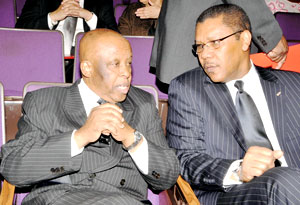NEW YORK (FinalCall.com) – Panelists at a recent two-day forum at Brooklyn’s Medgar Evers College sponsored by the Boston University African Presidential Archives and Research Center said the Obama administration has been sending “mixed” signals about Africa.

Ambassador Patrick R. D. Heyford, director of the Office of the UN Special Adviser on Africa, moderated “The Way Forward: U.S.-Africa Policy in the Age of President Obama” discussion. The U.S.-Africa relationship is changing because of the need for the continent’s resources, he said.
“America gets one-quarter of its oil from Africa, and that figure is climbing, and that is one of the reasons why policymakers are now seeing that the stakes are higher, (and) call for discourse with Africa,” Mr. Heyford argued.
African leaders and officials on the panel offered advice for Mr. Obama and the continent on how to move forward. Lazarous Kapambwe, Zambia’s ambassador to the United Nations, said, “All I would say to President Obama is please listen to Africa; there is no problem that is intractable.”
He was joined on the panel by the former president of the Republic of Botswana, Festus Mogae, and Dr. Agustine P. Mahiga, Tanzania’s UN ambassador. “We expect the United States to demonstrate leadership,” the Tanzanian ambassador said. “We have been receiving signals from the U.S. that this will be our time.”
The U.S. was present in Abuja, Nigeria as the mediator for the May 2006 peace agreement between the government of Sudan and the Sudanese National Liberation Movement, he said. “The U.S. pushed through an agreement prematurely, while what was needed was for the U.S. to aid in crafting a durable agreement; and by not doing so, some others were left from the peace table, and we see what level of conflict we have in Sudan today,” Amb. Mahiga said.
Political developments on the continent also raise questions, he said. “What is the role of the United States in Africa?” Amb. Mahiga asked.
Former President Mogae said he could not really in good faith talk about U.S.-Africa policy because there was no one from the administration on the panel. “Awkward and complicated questions must be asked of the Americans, and also of ourselves,” he continued. “See the finger I am pointing at you has one pointing back at me. I think we are both sending mixed signals to each other, the U.S. and Africa.”
Mr. Mogae urged the U.S. and Western governments to support the national unity government in Zimbabwe. “Unless the new administration gives its support to Zimbabwe Prime Minister Morgan Tsyngarai will be discredited and that will make it difficult to keep the government together,” Mr. Mogae said.
He also agreed with those who say it was premature to call for the arrest of Sudanese President Omar al-Bashir by the International Criminal Court based on alleged atrocities in his country’s Darfur region.
Zambian Amb. Kapambwe said Americans should ask the administration why the U.S. isn’t a signatory for the treaty that governs the International Criminal Court and, if human rights are important, why does the U.S. government seek exemptions from the international convention that governs the court?
“We criticize U.S. policy towards Africa as a friend,” said Amb. Kapambwe. “There needs to be a discussion on how the issues of the Democratic Republic of the Congo, Darfur, Zimbabwe and Somalia impact on U.S.-Africa policy,” he said.
The panelists may soon get definitive answers to questions about the Obama administration’s Africa policy. As they met, the president’s top Africa policy nominee, Amb. Johnnie Carson, appeared before the Senate Committee on Foreign Relations in Washington, D.C. Mr. Carson told the committee that if confirmed as assistant secretary of state for Africa, he would pursue a “broad” but “focused” agenda to protect U.S. interests and to promote African development.
The four immediate policy areas that would be priority for the administration include strengthening democratic institutions, preventing conflicts, fostering economic growth and partnering with Africa to combat global threats, he said. The Obama administration wants a balanced policy, he added.












